
Contact us
Our team would love to hear from you.

In today’s digital age, data has become an invaluable asset for organizations across all industries. However, the constant increase in data volumes presents both opportunities for profit and significant challenges for analysis and insight.
Traditional on-premises data warehousing solutions provide centralized access and analysis of operational data across systems. However, they often have limited scalability and cost-effectiveness.
Moving to the cloud eliminates the need to buy large amounts of expensive hardware, build huge server rooms, and make other infrastructure adjustments to overcome cost, scalability, and performance issues. In this article, we introduce the cloud data warehouse (CDW) — a modern solution that uses flexible, scalable cloud-based storage and computing to address the big data challenges of the digital age.
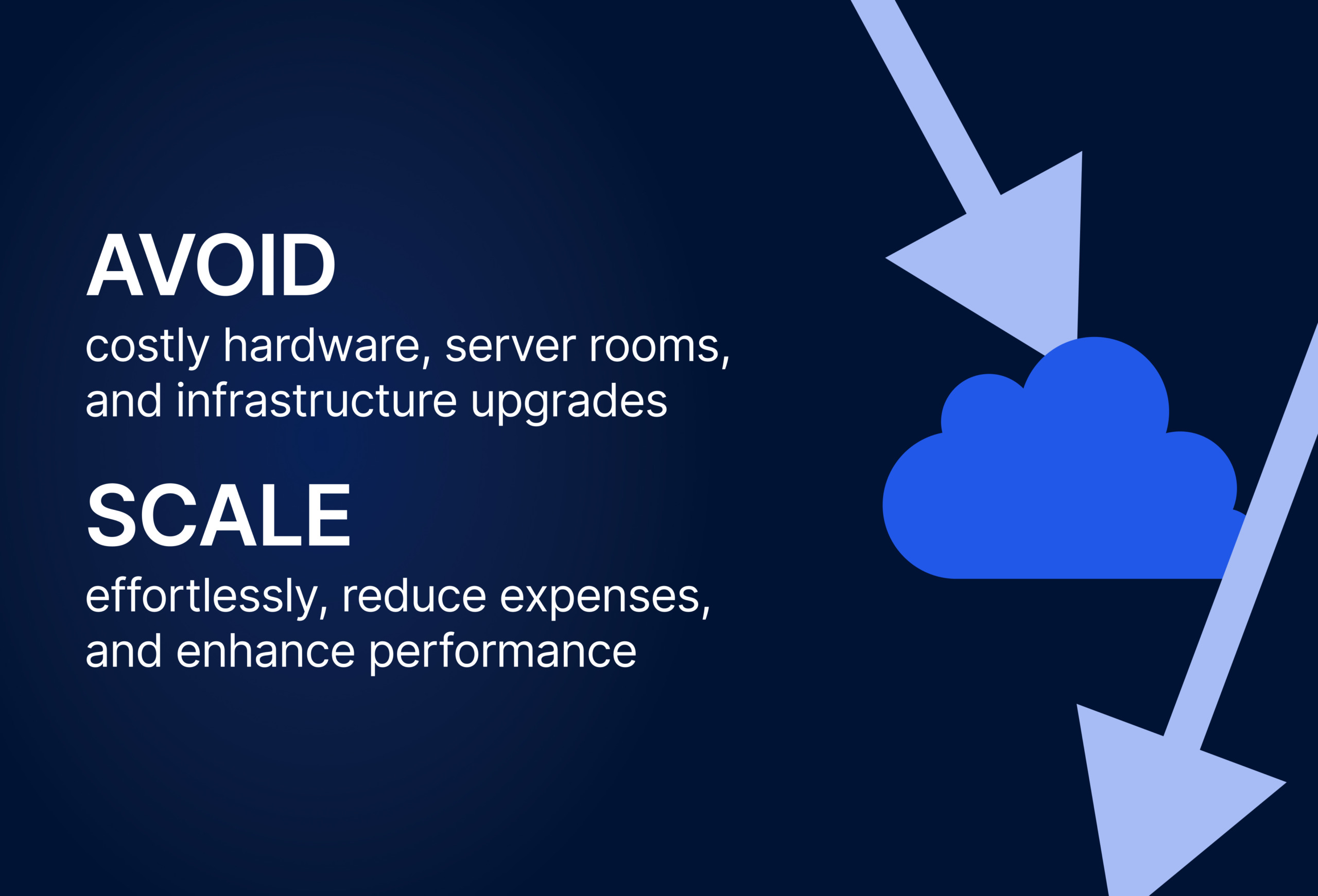
We provide an in-depth exploration of cloud data warehousing, examining the cloud storage model, how it differs from traditional ones, and the key benefits it offers. We also provide real-world examples of the solutions that leading companies are bringing to market to enable digital enterprises to gain competitive advantage through data-driven insights and decisions.
In its simplest form, a data warehouse is a large, integrated repository of data from multiple sources. It is designed to support business intelligence (BI) efforts such as data exploration, reporting, and mining. It can handle the volume, variety, and velocity of big data, making it suitable for organizations dealing with large amounts of data. Data warehouses break down data silos and streamline access to data from multiple sources, serving as a single source of truth (SSOT) for an organization’s data.
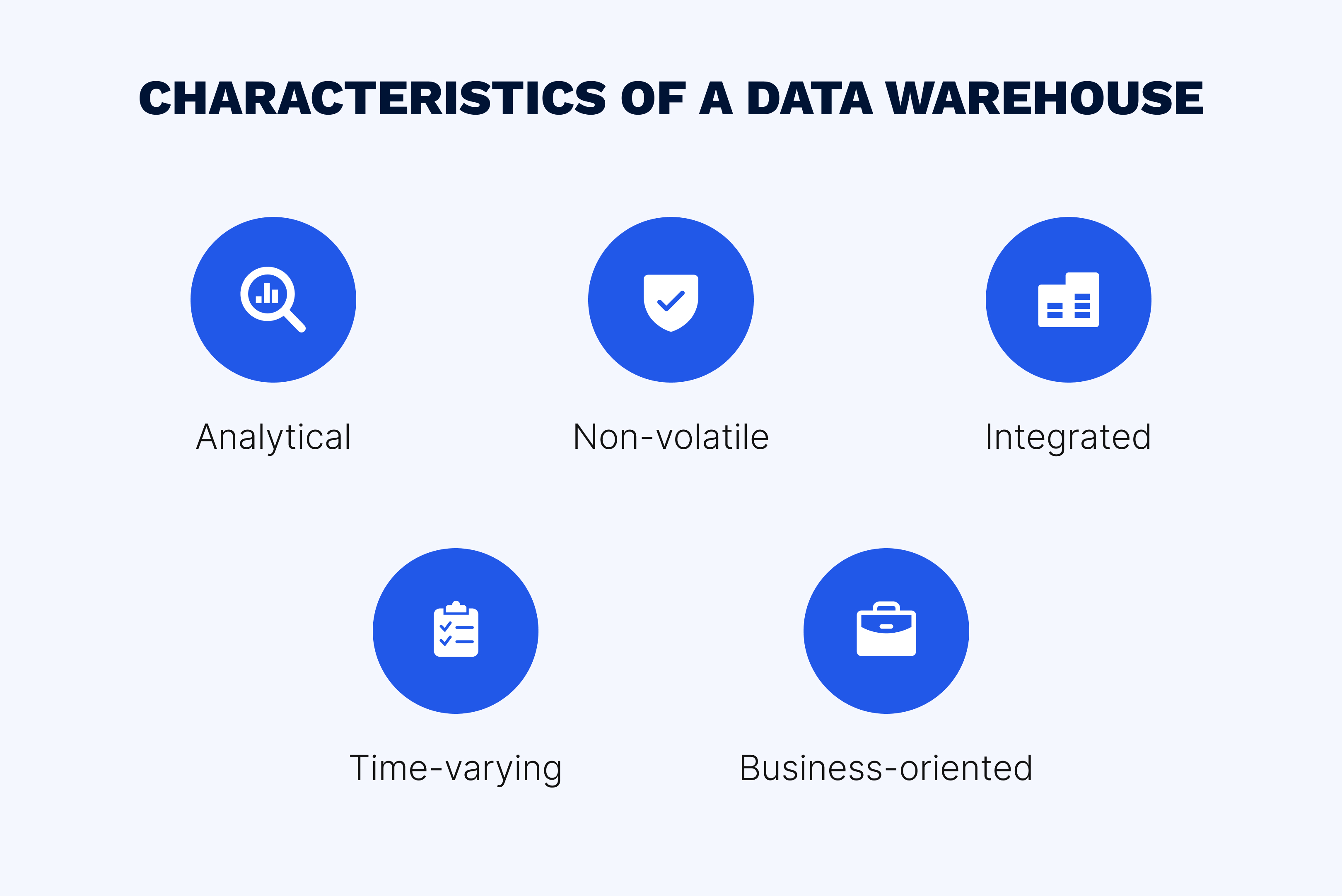
A data warehouse has unique characteristics that differentiate it from other data storage solutions. A data warehouse is:
![]() Business-oriented. A data warehouse organizes data based on specific topics or business areas, such as sales, customers, or financial data.
Business-oriented. A data warehouse organizes data based on specific topics or business areas, such as sales, customers, or financial data.
Integrated. A data warehouse incorporates data from multiple sources, including transactional systems, external data sources, and other databases.
Time-varying. A data warehouse archives historical data, enabling trend and pattern analysis over time.
Non-volatile. Once loaded into the warehouse, data remains untouched, ensuring data stability and reliability.
Analytical. A data warehouse is optimized for data inspection, enabling users to derive intelligent insights.
Alternatives to data warehouses for data storage include:
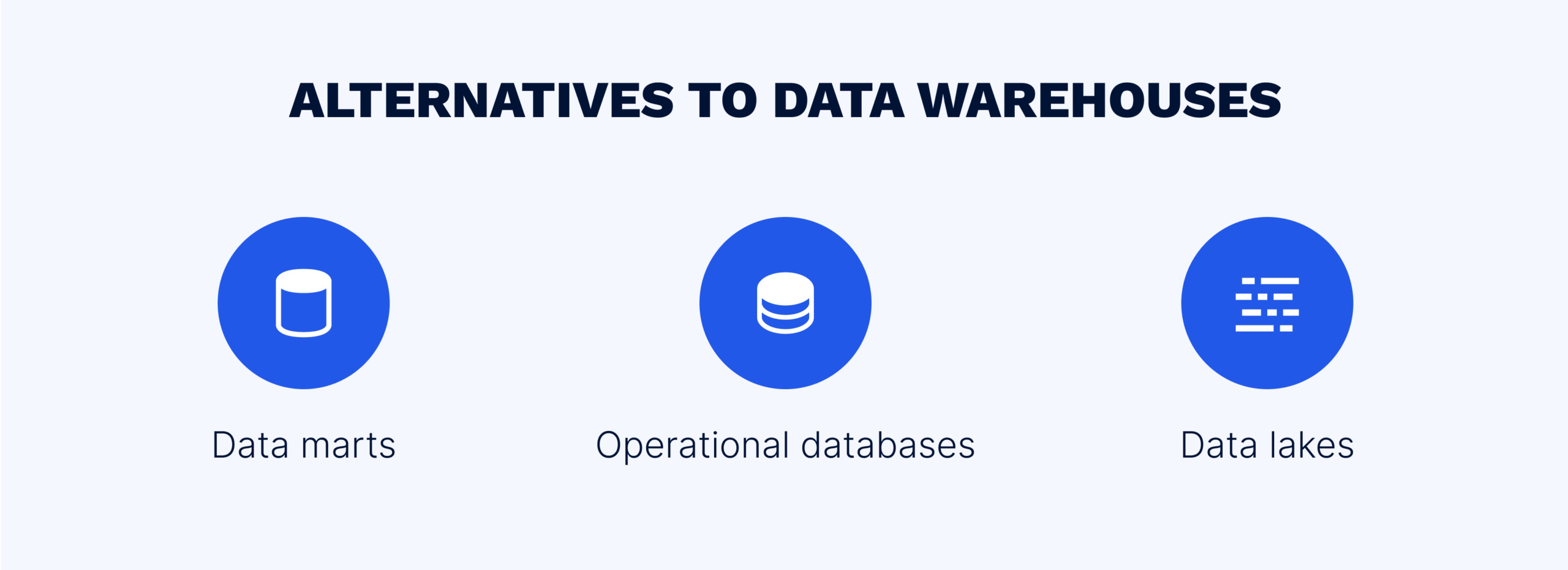
Designed for real-time transactions, operational databases can accommodate data insertion, update, and deletion. In contrast, data warehouses excel at query optimization and analytics, making them more suitable for reporting and analytical workloads.
Data marts serve specific business functions or departments and generally do not integrate data from multiple sources.
These are raw data storages for situations where data doesn’t need to be structured or transformed before loading, making them suitable for big data and IoT applications.
Traditionally, most large organizations built and managed data warehouses entirely within their on-premises infrastructures. This provided control over sensitive data and full ownership of the technology stack. However, major business and technology forces have driven a paradigm shift toward cloud-based solutions.
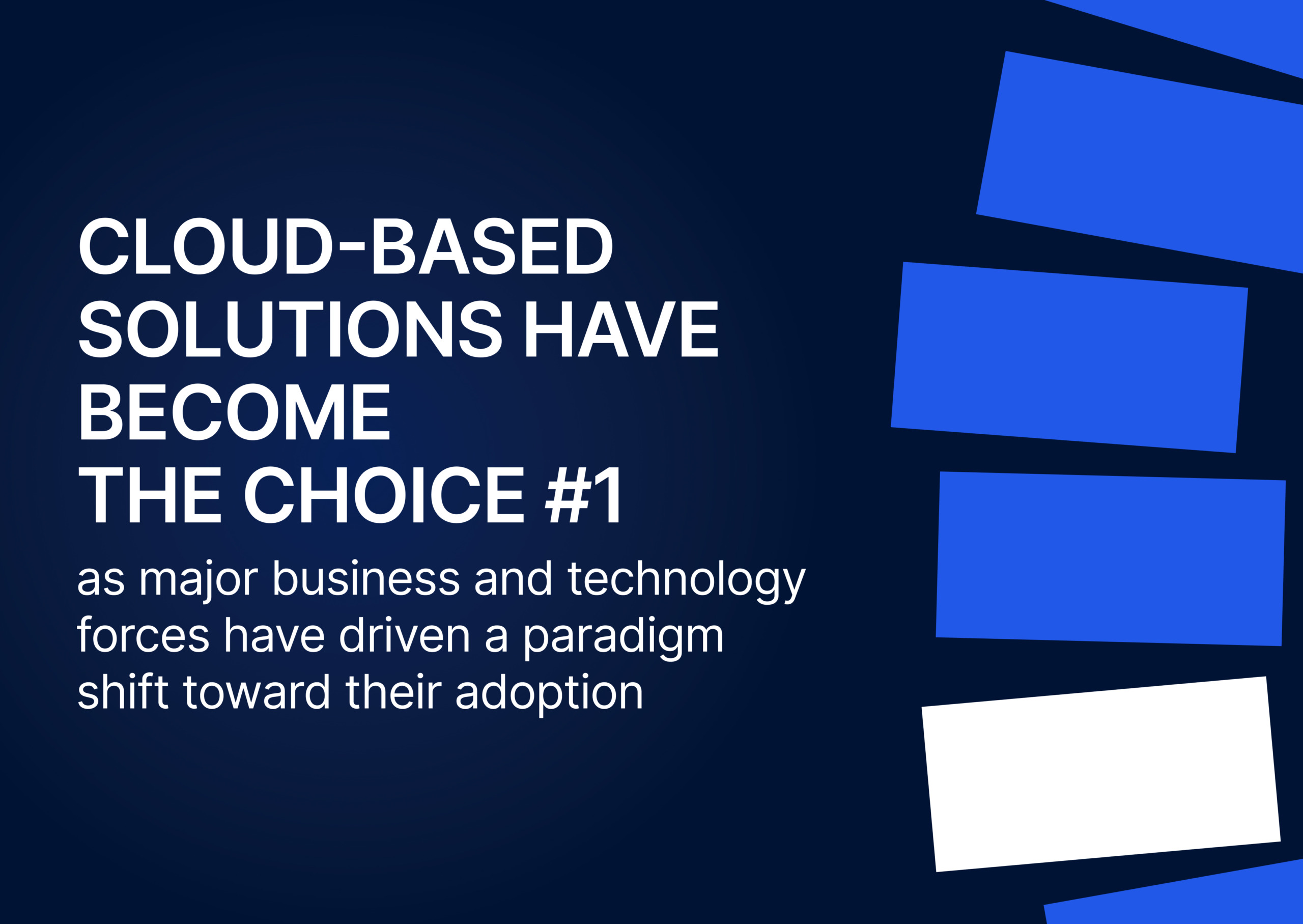
A CDW is a next-generation database system delivered via a public cloud and designed to support scalable BI and analytics capabilities. As a managed service, a CDW avoids the complications that traditional data warehouses face in managing increasing data volumes and evolving user needs.
CDWs use a blend of technologies, including massively parallel processing (MPP), columnar data stores, self-service ETL and ELT data integration, and automated backup and disaster recovery mechanisms. This stack demonstrates the flexibility CDWs offer over traditional on-premises data warehouses. Additionally, CDW usage shifts the burden of hosting infrastructure from enterprises to third-party providers through lease or subscription-based cloud services.
The key differences between on-premises data warehouses and CDWs are:
In an on-premises setup, companies fully control and manage the technology infrastructure. In the cloud, the responsibility is transferred to the third-party provider.
While scalability can be a limiting factor in on-premises warehouses due to the need for additional hardware investment, CDWs offer on-demand scalability that easily adapts to varying storage and processing needs.
On-premises solutions typically require large up-front investments, while CDWs largely operate on a pay-as-you-go model, significantly reducing capital requirements and providing superior cost control. Maintenance and upgrades: While on-premises warehouses place the burden of maintenance and updates on the organization, a CDW shifts this burden and eliminates significant maintenance obligations.
The power of CDWs reaches far beyond basic storage capabilities, offering an array of technical advantages.
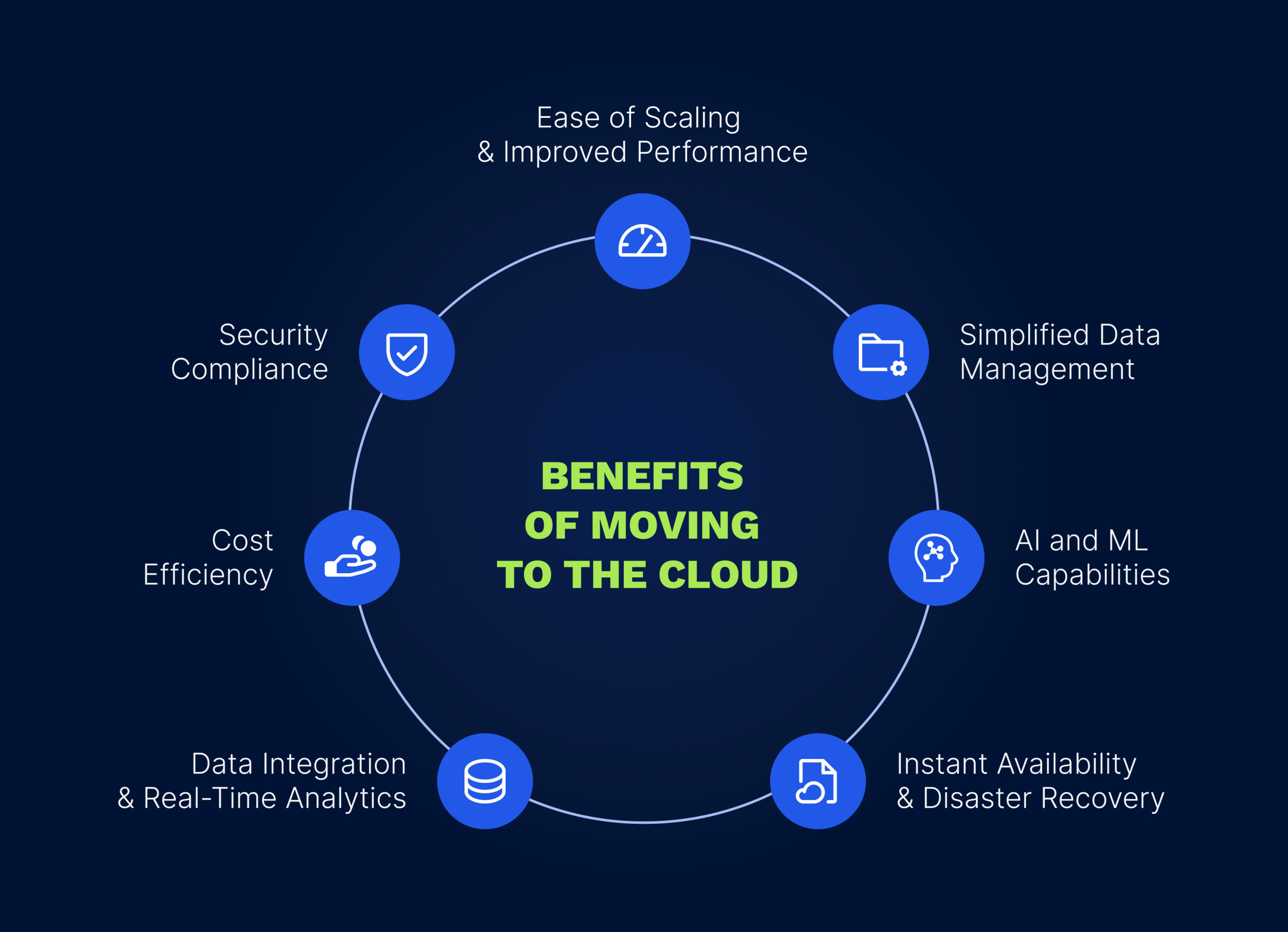
CDWs employ a consumption-based model, meaning you pay for the resources you actually use. This scalability eliminates the need for significant upfront hardware investment and reduces maintenance costs. Technically, this model enables companies to increase computational power and storage when required and scale down during off-peak periods to prevent wasted resources.
CDWs have a flexible architecture supported by the elasticity of cloud technologies. This scalability allows CDWs to grow alongside the business, eliminating the need for manual infrastructure expansion. Coupled with features like on-demand resource allocation and automatic query optimization, CDWs ensure optimal performance no matter the volume or complexity of your data.
CDWs offer robust data replication and backup features. Data is replicated across various servers, resulting in virtually limitless availability and redundancy. This immediate backup support also provides a substantial technical advantage when it comes to disaster recovery, as data can be quickly restored, ensuring minimal downtime.
Data security is paramount for any organization. Most CDWs have built-in encryption for data at rest and in motion, protecting sensitive information from unauthorized access. They also offer robust access-control mechanisms ensuring only authorized individuals can access sensitive information. Moreover, cloud providers ensure their services are compliant with various international and industry-specific regulations, relieving organizations of a portion of that responsibility.
CDWs support integration with a wide range of data sources — from relational databases to streaming data inputs. This integration capability, combined with real-time analytics, delivers insights with incredible speed. With a CDW, data ingestion and processing occur concurrently, reducing the time delay between data generation and actionable insight.
CDWs include automated features for data management tasks, from database tuning to updates. This reduces the burden on IT teams, allowing them to focus on strategic initiatives rather than routine maintenance. In addition, many CDWs support SQL and other familiar query languages, simplifying data manipulation and retrieval.
With cloud computing power, CDWs can efficiently handle artificial intelligence (AI) and machine learning (ML) workloads. These technologies can analyze vast datasets, uncover patterns, and generate insights that were previously either impossible or highly resource-intensive.
The availability of CDWs is signaling a new era in data management. Capable of handling exabytes of data to run complex queries, CDWs serve as the backbone of customer analytics. With several leaders in the market, such as Amazon’s RedShift and Google’s BigQuery, offering CDW services, the question is: How to choose the right solution provider for your needs?
Critical to the selection process is understanding that the leading cloud providers — Amazon Web Services (AWS), Microsoft Azure, and Google Cloud Platform (GCP) — each offer fully managed services with unique selling points.

At the top of the market, AWS Redshift provides additional storage and computing resources beyond standard virtual private cloud (VPC) instances. Its use of columnar storage and massively parallel processing (MPP) architecture accelerates performance, making data easily accessible for complex analytics.
Azure Synapse Analytics combines the power of data warehousing and big data analytics. It provides a fully managed SQL pool, ideal for warehousing, seamlessly coordinated with an Apache Spark engine for lightning-fast analytics at any scale. This powerful combination facilitates streamlined data analysis, making it a strong competitor.
The enterprise data warehouse Google BigQuery is optimized for advanced analytics. Its strength lies in its support for federated queries across multiple Google Cloud or third-party data sources. Offering zero resource management and effortless scalability to exabytes, BigQuery can be a favorable choice for expansive and analytical business operations.
Ultimately, choosing the right CDW is about aligning business objectives with technical requirements to meet your organization’s unique data tracking, analysis, and management needs. A strategic selection process is the key to making the best CDW choice. Our team of experienced data scientists is happy to help you make the right choice to avoid wasting precious time and money!

In today’s data-driven business environment, leveraging cloud data warehousing has become imperative for enterprises. It facilitates access to an SSOT across an organization at any scale. With intelligent insights powered in real time, data-fueled decision making becomes far more straightforward.
To take full advantage of CDW, organizations should consider migrating existing data warehousing workloads or building new consolidated data environments in the cloud. This approach allows companies to reap all the benefits offered by CDW platforms.
At EffectiveSoft, we understand the importance of leveraging cloud data warehousing to drive business success. Our team of experts can help you navigate the complex process of migrating your data warehousing workloads to the cloud, ensuring a seamless transition and maximizing the benefits of cloud data warehousing for your organization. Contact us today to learn more about how we can help you leverage the power of the cloud to transform your data management strategy and analytics capabilities.
Our team would love to hear from you.
Fill out the form to receive a consultation and explore how we can assist you and your business.
What happens next?